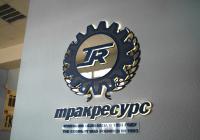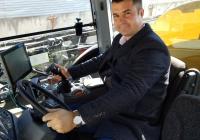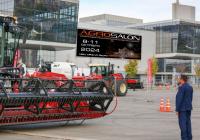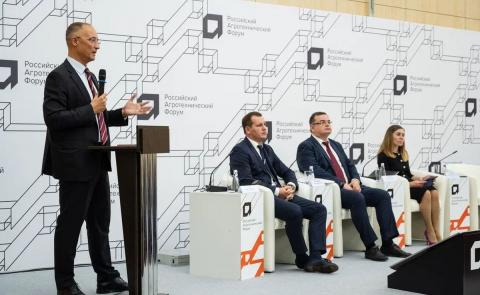
On October 3, Moscow hosted the Russian Agrotechnical Forum, the most significant event in the field of agricultural engineering. This unique event in the field of agricultural engineering, where representatives of agribusiness and government give frank comments on the most difficult issues, is traditionally held on the eve of the international exhibition AGROSALON-2022. The main topic of the plenary session of the forum this year is designated as "Russian agricultural engineering in the new reality." AgroMediaHolding Svetich took part in the Russian Agrotechnical Forum-2022 as a member of the Rosspetsmash Association.
The event brought together more than 300 people, including heads of state authorities, owners of agricultural holdings and machine-building enterprises, heads of service and dealer organizations, industry experts and the media. The forum is held within the framework of the international exhibition AGROSALON, on the territory of the Crocus Expo IEC. The organizer of the exhibition and forum is the Rosspetsmash Association with the support of the Russian Ministry of Industry and Trade.
The forum was attended by: Director of the Department of Agricultural, Food and Construction and Road Engineering of the Ministry of Industry and Trade of Russia Maria Elkina, Director General of KZ Rostselmash LLC Valery Maltsev, Director of the Department of Crop Production, Mechanization, Chemicalization and Plant Protection of the Ministry of Agriculture of Russia Roman Nekrasov, Director of Pegas- Agro” Svetlana Linnik, General Director of the OJSC “Altai Research Institute of Engineering Technology” Roman Pfaf, General Director of the Institute for Agricultural Market Studies Dmitry Rylko, Head of the peasant (farm) economy in the Voronezh Region Nikita Tokmakov.
As the moderator and chairman of the forum, chairman of the Board of Directors of the Rosspetsmash Association, Konstantin Babkin, noted, experts meet here to compare watches, discuss the situation and outline plans for the future.
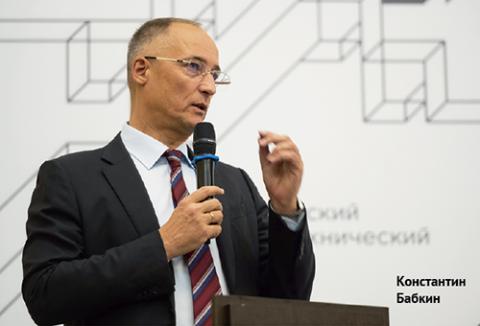
According to Konstantin Babkin, over the past nine years, Russian agricultural engineering has been actively developing, increasing exports. And in the difficult conditions of today's realities, it successfully restructures, continues to develop, and develops enterprises, which shows the viability of Russian agricultural engineering.
However, the situation in the industry is not easy. In particular, under sanctions, manufacturers are faced with the need to either master the production of components themselves or find alternative suppliers.
Meanwhile, according to Konstantin Babkin, producing agricultural machinery in Russia is still more expensive than buying it abroad. “Today, our producers are in an unstable situation, but it is connected not so much with external factors as with internal ones. We need stable support and a future-oriented policy of the state.”
Konstantin Babkin made specific proposals to the government for the successful development of the industry. In particular, it is necessary to ensure the provision of loans to industrial and agricultural enterprises at a rate of 0-1%. Do not impose restrictions on the access of agricultural products to foreign markets. Significantly increase the volume of crop insurance and reduce insurance premiums.
Guarantee minimum prices for agricultural products for agricultural producers in the domestic market. Provide funding for the implementation of the 1432 program in full, in accordance with the actual need of agricultural machinery manufacturers. Provide for a mechanism for providing manufacturers with subsidies in the form of grants for the development of the production of components for agricultural machinery with funding from the federal budget in 2022-2026. in the amount of at least 10 billion rubles. annually.
Konstantin Babkin noted that the most critical moment, the most important topic of our time, is that the supply of components, logistics, and the deepening of localization, increasing the production of components in Russia is a task for the next time period, the next few years.
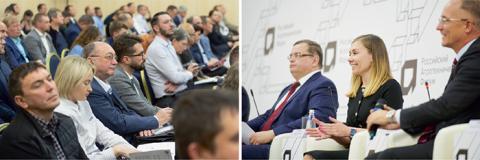
“The situation here is not simple, we had powerful suppliers of components from the West, today these companies or suppliers for the most part cannot supply, communications have been destroyed, and we are faced with the need to find other suppliers, either master the production of components in Russia at our enterprises or find subcontractors . Dear government, make it profitable to produce in Russia! We need stable support not only for the largest sustainable machine-building enterprises, this support must be available for the smallest plant in a difficult situation,” Konstantin Babkin is sure.
He also noted that “Russia has the best conditions in the world for mechanical engineering, we have all imaginable and unimaginable resources, huge traditions, people want to work, there is a market, demand, but create the conditions for all this to flow, production to become possible.” made sense as a long-term investment.
This is the nerve of the moment today, the nerve of the situation. I hope that this is a dilemma or the issue will be resolved in favor of the manufacturers. Moreover, everything pushes us to this. I would like to see a sustainable government policy to increase production in Russia, to increase exports.”
Regarding the support of agricultural machinery industry, Konstantin Babkin noted that the 1432 Program has been the core of state policy in recent years, the main measure aimed at supporting the development of agricultural machinery production in Russia. This measure is now underfunded, only half funded, although the president said at least 8 billion. With this wish, the speaker addressed the Russian government.
Director of the Department of Agricultural, Food and Road Construction Engineering of the Ministry of Industry and Trade of Russia Maria Yolkina spoke about new and existing state support measures.
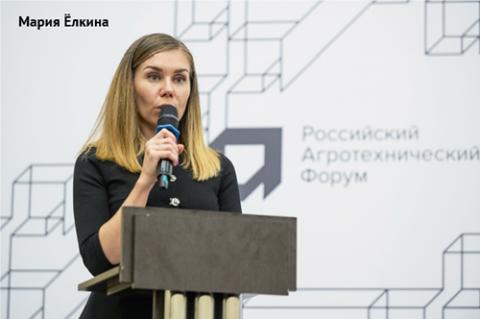
The director of Pegas-Agro LLC, Svetlana Linnik, in her speech said that in February of this year, logistics chains were broken, “we have restored communications, this system does not interfere with the operation of the enterprise now, with the exception of some rise in price. Alternative suppliers were found in friendly countries - in Turkey, in China, on the territory of Russia, Belarus.
The plant has a fairly powerful machine park, good competencies of specialists, so a number of components and components are mastered on their own, and where it was impossible to master, they began to introduce new engineering and technological solutions.
The challenges that the plant is facing today are the increase in the cost of equipment. The strengthening of the ruble exchange rate did not play a plus, but a minus. After a certain pause, imported equipment returns to the market, and equipment from friendly countries, for example, China, also enters, which does not make it easier to work with the end buyer.
The plant has a fairly new machine park, imported, and there are problems with equipment maintenance. In a few years, there is a risk of stopping not because there will be no components of our own production, but because the machines and equipment will not work. This task also requires a centralized, comprehensive solution; it is necessary to stimulate those enterprises that are ready to produce spare parts for imported machine tools, of which there are a lot in Russia.
“The challenge of today, the last time, is that out of 500 people, 400 of us are young people in the age category from 25 to 35 years old, we are faced with a high risk of losing key specialists due to possible mobilization,” notes Svetlana Linnik.
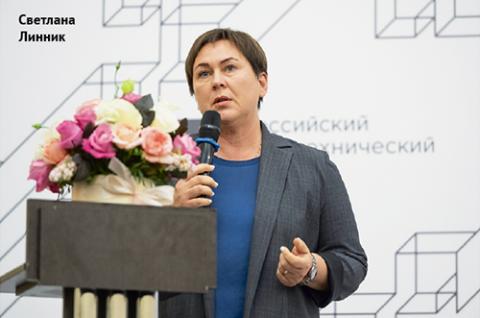
All manufacturers of self-propelled vehicles were faced with the fact that the brains of machines were often purchased in America. “We are working quite successfully in this direction, we have developed our own electronic control system to a high degree of readiness, about 40 machines are being tested on the territory of the Russian Federation. I think that in the near future all machines will be equipped exclusively with an electronic control system of our production,” says Svetlana Linnik.
And there are a number of problems here. If everything is good in Russia in terms of software, then the electronic component base is purchased in China, and this is a high-risk area. It is necessary to pay attention to it at the state level in order to work with electronic components on the territory of the Russian Federation.
If we talk about the strengthening of the ruble, before the February events, the price of equipment on a global scale was the cheapest, and now it is approaching the highest mark, in comparison, for example, with Chinese sprayers. This also affects the export part, and complicates the promotion of the car on the territory of the Russian Federation. Here it is very important that the 1432 program be preserved in full, since this tool works very well and makes it possible to purchase Russian-made equipment at interesting prices.
Valery Maltsev, Director General of LLC KZ Rostselmash, in his speech said that Rostselmash has been engaged in import substitution, localization in the Russian Federation for more than 15 years, and identifies five areas - this is the import of advanced technologies for product import substitution, entering related product segments, creating a component base at the enterprise , the creation of technology in the manufacture of products, this is the development through the development of suppliers, and digital solutions.
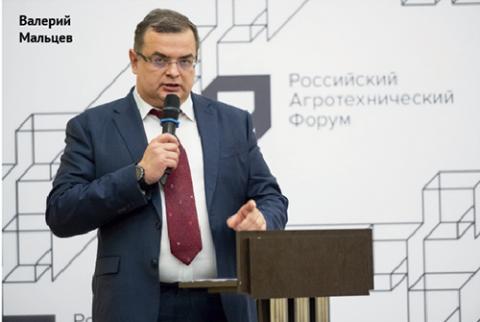
"We believe that China is a temporary solution for us, in the future it may be a potential threat, therefore, tactically - we are deploying in China, strategically - we need our own competencies, or Russian suppliers."
Therefore, the company has found more than 50 suppliers in the regions of Russia for various components, and they are mastering the production of the component base themselves. For digital solutions: they develop telemetry systems for machine-to-machine interaction, auto-driving systems based on the GLONASS system and machine vision. Automation system for technological processes in combines and tractors.
In addition to the high cost of production in Russia, Valery Maltsev also noted the high share of borrowed funds in the capital structure of Russian manufacturers. As well as outdated equipment, the lack of modern technologies for the production of components from Russian suppliers, the lack of guarantees for real Russian investors and the lack of competencies in the field of finance and economics, it is difficult for small suppliers to apply even to the FRP. These are the issues that will need to be addressed in the near future.
Roman Pfaf, General Director of OJSC "Altai Research Institute of Engineering Technology", said that this year the plant for the first time faced the fact that supply began to outstrip demand. The decline in the volume of applications this year was influenced by breaks in logistics chains, which led to an increase in delivery times and an increase in the cost of components. But the main point was still the strengthening of the ruble exchange rate and, as a result, the almost equalization of prices for Russian equipment with the prices of similar equipment from foreign manufacturers.
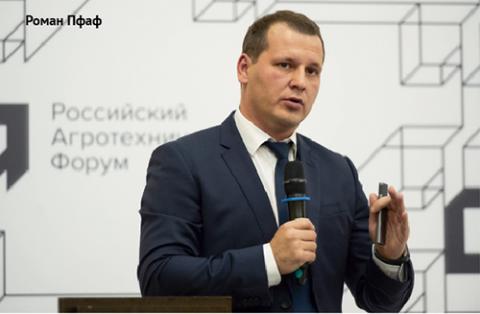
The second factor that the company faced in August was the decline in food prices and the restriction of exports. Accordingly, all these factors have led to the fact that now we are experiencing a small crisis of overproduction, and we are forced to solve problems related to reducing the cost of production and increasing sales.
To reduce the cost, the company will move from the level of localization from 75 to 90%. It is important to establish the production of one of the components of the equipment, namely, the S-shaped rack, which is used on cultivators. And in almost six months, the plant was able to organize a site that today is capable of producing up to 100,000 such products a year for its own consumption and for other plants.
Right now, the main difficulty, according to Roman Pfaf, is the strengthening of the ruble, this is an increase in the cost of manufactured products, and, as a result, a decrease in its competitive advantage, price advantage, in relation to imported manufacturers.
Roman Nekrasov, Director of the Department of Crop Production, Mechanization, Chemicalization and Plant Protection of the Russian Ministry of Agriculture, spoke after the speeches of the agricultural machine builders.
“Today we are all with you in new realities, and therefore the focus of attention this year is to ensure the food security of our country. We would never have made such a breakthrough in our level of technology, productivity, if we did not have such support provided by domestic manufacturers of agricultural machinery and the Ministry of Industry and Trade of the Russian Federation, and many thanks from the farmers for this,” said Roman Nekrasov.
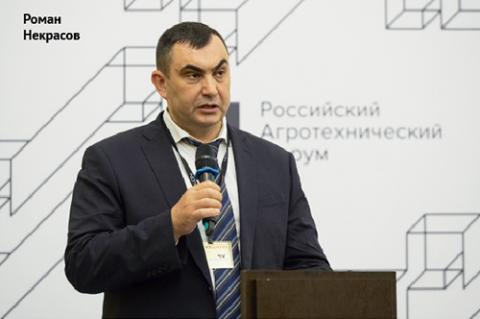
According to the Ministry of Agriculture of the Russian Federation, which he announced at the forum, as of September 28 of this year, the agrarians of our country purchased 2,059 fewer tractors than last year. Compared to last year, we have reduced the purchase of grain and forage harvesters. “This suggests that the body of requests that the Russian agro-industrial complex has are very large,” Roman Nekrasov is sure.
And then he said that we have dramatically increased the cost of one transaction for the purchase of agricultural machinery. “Again, in figures, last year, as of September 28, we had allocated 34 billion rubles of concessional loans with state support for 2,355 borrowers,” says Roman Nekrasov. - This year, the number of borrowers is 2908, that is, almost at the level, the approved amount of loans amounted to 82.5 billion rubles, the cost of one transaction increased by about 40%.
The state needs more and more resources to provide affordable equipment for agricultural producers. Here, using this platform, I would like to note that the 1432 program is a real tool that makes equipment cheaper for agricultural producers. We really want it to be fully funded, so that our farmers have the opportunity to purchase high-quality domestic equipment at a discount.”
Further, Roman Nekrasov said that the Ministry of Agriculture of Russia used not only concessional lending, but also other resources and tools to stimulate demand.
First, these are regional programs. Next is Rosagroleasing, which was additionally financed twice this year - by 12 and 20 billion rubles.
On behalf of the President of the Russian Federation, a strategy has been developed to increase agricultural production by 3% annually until 2030. By 2030, it is planned to increase the number of our equipment to 500,000 agricultural tractors, today there are 430 of them.
We must have at least 160,000 grain harvesters, today there are 124,000 of them. The percentage of depreciation of agricultural machinery in enterprises remains quite serious, and the load on one unit of equipment is also quite high.
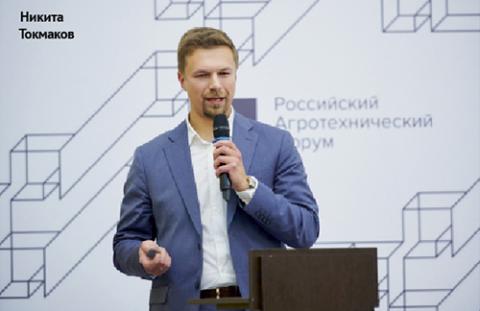
The next speaker of the forum, Nikita Tokmakov, on behalf of farmers, said that in difficult conditions, as, for example, now, when prices for agricultural products do not allow making a profit, the first thing that farmers refuse is the purchase of new agricultural machinery and equipment. Then - from long-term investment projects, and the third is the application of fertilizers. According to the speaker, farmers see a one and a half to two times increase in the price of agricultural machinery, and someone even more. Those are pretty serious numbers. And taking into account the not optimistic forecasts for the purchase prices for the harvest, the farmer suggested that he would have to save.
